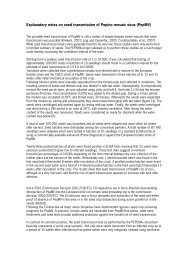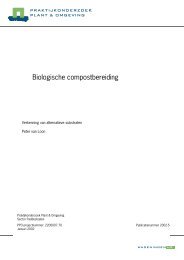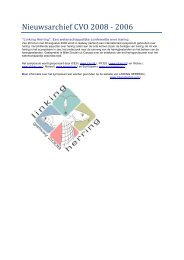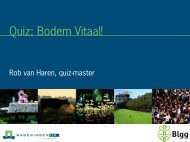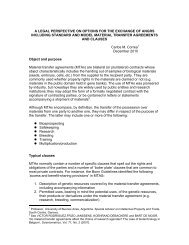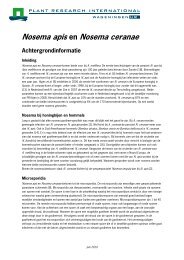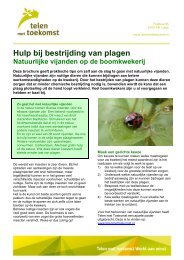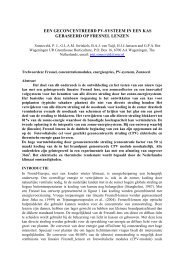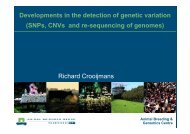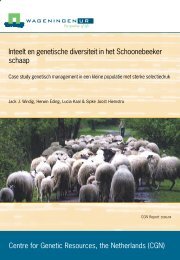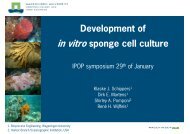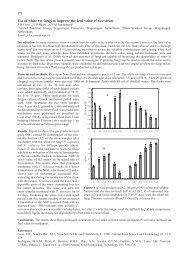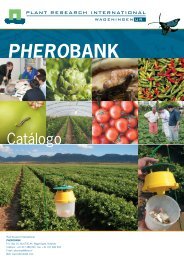When the going gets tough... - Wageningen UR
When the going gets tough... - Wageningen UR
When the going gets tough... - Wageningen UR
- No tags were found...
Create successful ePaper yourself
Turn your PDF publications into a flip-book with our unique Google optimized e-Paper software.
2 >> labour of love>> FRANS + BLUESFrans van de Goot, financial controller Social Sciences‘Variety is our strong point’Thursday evening practice with <strong>the</strong> guys has been afixture in bass player Frans van de Goot’s life for 17years. And now and <strong>the</strong>n a performance with his bandDouble-U-Blues (formerly Gazzary). It’s all about havingfun with music. Blues because it’s so relaxing, and awide variety of covers. The ‘Double-U’ stands for <strong>the</strong> Wfor <strong>Wageningen</strong> of course (see www.double-u-blues.com). RK / Foto: Guy Ackermans(Do you have a colleague with a passionate interest? Let usknow: roelof.kleis@wur.nl)RESO<strong>UR</strong>CE — 31 January 2013
COVER PHOTO: MANON BRUININGA>>CONTENTSno 11 – 7th Volume>> 4‘CHERISH THE DISSIDENTS’Out<strong>going</strong> education director: ‘Weshould be more open to criticalreflection.’>> 20THE LONELY HALFHow do partners of international stafffare? ‘<strong>Wageningen</strong> is not very lively.’>> 27VERA COMES HOME‘Well, you’ve had one Tripel too many,’said Willem-Jan.AND MORE...2 Labour of loveblues4 News and opinion8 Science11 Resource.wur.nl12 Leading lights16 In <strong>the</strong> picturegoose game18 Sustainability20 The lonelier half22 IMObasic grant24 Student29 Column32 Typical DutchDutch doctorNO CHOICESo that’s how it goes when a merger is unscrambled. This is <strong>the</strong> last Resource tobe distributed to VHL. There will be no more stories about <strong>the</strong> solar boat Sinnfretter,student research on barn fires or war relics in Mariëndaal, or lack ofconfidence between <strong>the</strong> VHL board and <strong>the</strong> staff council.That’s it, folks. Over and out. We have no choice, and that is how it feels too. Wehave built up relations with student reporters, administrators, teachers and <strong>the</strong>participatory bodies. Take Emma Holmes, for example. She lives in <strong>the</strong> Bennekomresidence Beringhem. She knows <strong>the</strong> <strong>Wageningen</strong> pubs and <strong>the</strong> internationalstudent community. She cycles around <strong>the</strong> campus, attends lectures in <strong>the</strong>Forum. She is a columnist for Resource (see page 29) and writes with humour –often directed at herself – and verve. But she’s out of a job now. Because Emmais a VHL student.Emma, as far as we are concerned, you are welcome to pick up a copy of Resourcein <strong>the</strong> Forum. But keep it under your hat!Gaby van Caulil>> And <strong>the</strong> goose <strong>gets</strong> away again. A reconstruction of Hollandas a goose heaven – in <strong>the</strong> form of a goose game. | p. 1631 January 2013 — RESO<strong>UR</strong>CE
news<strong>Wageningen</strong> <strong>UR</strong> should have <strong>the</strong>courage to be more open to criticalreflection and listen to <strong>the</strong> ‘dissidents’within <strong>the</strong> organization.That was <strong>the</strong> key message that educationand research director AbGroen put across in his farewelllecture on 24 January.Groen was not afraid to reflecton <strong>the</strong> directors present in <strong>the</strong>room. For instance, he said it was‘hilarious’ that university directorsand researchers advocate autonomyand self-monitoring ‘in view of<strong>the</strong> recent failures in self-monitoringin <strong>the</strong> case of directors’ payand scientific fraud.’Such contradictions raise <strong>the</strong>suspicions of <strong>the</strong> general public.Groen thinks that you can onlychange this by paying more attentionto <strong>the</strong> individual motivationsof students and researchers. He isagainst <strong>the</strong> abolition of <strong>the</strong> basicgrant, selective admissions andsetting up so-called honours programmes.Such measures are turning<strong>the</strong> universities into ‘Humboldtinstitutions’ - ivory towers -whereas <strong>the</strong>y should be developinginto networking knowledge institutions.Universities also need to makesure <strong>the</strong>y do not lose contact with<strong>the</strong> students. ‘The biggest challengefor universities now is to beaware of <strong>the</strong> trends among youngpeople.’ He mentions <strong>the</strong> use of ITas an example. ‘A lecturer found itirritating that students were messingaround with Facebook andTwitter during practicals. I don’tagree. Sixty percent of new studentshave mobile internet. So itshould be <strong>the</strong> o<strong>the</strong>r way around -<strong>the</strong> lecturer should start tweetingwith <strong>the</strong>m instead. <strong>Wageningen</strong>University should invest more in<strong>the</strong> use of social media in <strong>the</strong> learningenvironment so you are givingenough support to <strong>the</strong> ITtrendsetters among <strong>the</strong> students.’That is why you need a structuraldialogue between <strong>the</strong> universityand its students ‘starting with <strong>the</strong>acknowledgement that young peopleshould have a say,’ argues Groen.He feels consultations between <strong>the</strong>board and <strong>the</strong> student council aretoo much of a ‘ formal exercise’ without‘<strong>the</strong> intrinsic willingness todiscuss key policy decisions.’The university directors shouldorganize such questioning of itspolicy <strong>the</strong>mselves, says Groen, whoacted as an advisor to <strong>the</strong> board for<strong>the</strong> past seven years. ‘Make sure<strong>the</strong>re is sufficient critical reflection.’He says managers become lazyif <strong>the</strong>y aren’t confronted with resistanceor dissidents, or else <strong>the</strong>ythink <strong>the</strong>y can get away with anything.‘A strong organization isprepared to make room for dissidentsbecause <strong>the</strong>y improve <strong>the</strong>quality of <strong>the</strong> decision-making process.’According to Groen, it is thosevery critics who throw a differentlight on matters and who canexpose <strong>the</strong> weak points in policychoices. ‘We must have <strong>the</strong> courageto have honest differences ofopinion. There needs to be a culturegrounded in commitment andcreativity in which staff feel safe totake risks and take action. Resistanceis about voicing your own views andseeking links with o<strong>the</strong>rs based onyour own sense of worth.’ ASAb Groen has spent more than30 years at <strong>Wageningen</strong> University,first as a student and <strong>the</strong>nas a lecturer in <strong>the</strong> Animal Breedingand Genetics group and laterhead of teaching within AnimalSciences. He has spent <strong>the</strong>last seven years as director ofCorporate Education, Research &Innovation at <strong>Wageningen</strong> <strong>UR</strong>.As of 1 February, he will bechairman of <strong>the</strong> board of Helicon,a centre for pre-vocationaland vocational agricultural education.RESO<strong>UR</strong>CE — 31 January 2013
news
newsIn 2011 <strong>the</strong> university used: 10,612chickens, 1254 mice, 7558 fish,367 pigs, 215 rats, 185 cows, 14horses, 13 cat and 43 birds. Total:19810 animals used in educationand – above all – research. A recordnumber, <strong>the</strong> university’s averagebeing about 15,000 animals peryear.The reason for this peak in 2011was an increase in behaviouralresearch on chickens. According tolicense-holder Rob Buré, this cameabout partly as a result of <strong>the</strong> banon battery chickens. In 2011,<strong>Wageningen</strong> studied <strong>the</strong> behaviourof nearly 15,000 chickens,including <strong>the</strong> positive effect ofdust baths or pecking behaviourdirected at members of <strong>the</strong> samespecies. According to Buré, thissort of research causes <strong>the</strong> animalsmild distress. Blood is taken, forexample, to measure levels ofstress hormones, but no majoroperations are performed.<strong>Wageningen</strong> does a lot of animalresearch compared with o<strong>the</strong>rDutch universities. Only threeuniversities used more animals inexperiments: Utrecht, Groningenand Nijmegen. DLO institutessuch as CVI, Imares and Rikilt arenot included in <strong>the</strong>se statistics.But that is due to change. In 2008,a joint code of transparency aboutanimal experiments was signed by<strong>the</strong> universities, academichospitals and <strong>the</strong> Dutch academyof sciences. This will lead togreater transparency across<strong>Wageningen</strong> <strong>UR</strong> as well. NextMonday <strong>the</strong> executive board will bediscussing a report on animalexperiments and dilemmas inanimal research. This includesdata about <strong>the</strong> use of animals byDLO institutes. It is <strong>the</strong> first time<strong>the</strong> organization has made <strong>the</strong>sefigures public. Its own spokesperson, logo andpresentations. And no more Resource.The hiving off of Van HallLarenstein Applied Sciences Universityfrom <strong>Wageningen</strong> <strong>UR</strong> isstarting to take shape. At <strong>the</strong> endof 2012, <strong>the</strong> applied sciences universitygot its own supervisoryboard and executive board. Negotiationsare now <strong>going</strong> on aboutfur<strong>the</strong>r steps to undo <strong>the</strong> merger.As of <strong>the</strong> beginning of 2013, VHLstaff and students no longer receiveResource. VHL has plans forits own magazine, preferably tostart as soon as possible. Nor will<strong>the</strong>re be any more input from VHLfor <strong>the</strong> alumni magazine <strong>Wageningen</strong>World. Fur<strong>the</strong>rmore, <strong>the</strong> appliedsciences university will nowdo its own public relations and <strong>the</strong><strong>Wageningen</strong> <strong>UR</strong> logo will no longerbe on presentations and newbrochures. ‘Some ties are easy to break,’ sayshead of Communications Marc Lamers.‘O<strong>the</strong>rs take a little longer.’For example, people at Communicationsare still figuring out howVHL’s access to <strong>the</strong> intranet can becancelled. ‘These are technicalplatforms and adjusting <strong>the</strong>mtakes a bit more than a push of abutton.’In o<strong>the</strong>r areas <strong>the</strong> ending of <strong>the</strong>merger is more complicated. Talksare <strong>going</strong> on, for instance, aboutICT and o<strong>the</strong>r support services. Asto how <strong>the</strong>se negotiations are<strong>going</strong>, <strong>the</strong> university is keeping itsmouth firmly shut. The only thingLamers will say is that <strong>the</strong>y are conductedin a very friendly spirit. ‘It isnot a question of pulling <strong>the</strong> plugout, and “goodbye and thank you”.We are looking toge<strong>the</strong>r for <strong>the</strong> mostsensible way of organizing it.’ RESO<strong>UR</strong>CE — 31 January 2013
news
science<strong>Wageningen</strong> microbiologists getinto top journals quite often. But apublication in a top medicaljournal is more unusual. Thisweek, <strong>the</strong>y and <strong>the</strong>ir Amsterdammedical colleagues explain in TheNew England Journal of Medicinehow you can cure <strong>the</strong> moststubborn bowel infections. Thesecret? Faecal transplants.The experiment revolvedaround a group of diarrhoeapatients suffering from persistentbowel infections with <strong>the</strong>Clostridium difficile bacterium.Doctors usually treat this ailmentby blitzing it – repeatedly – withantibiotics. But about 20 percentof <strong>the</strong> patients do not respond andevery time <strong>the</strong> infection comesback, <strong>the</strong>ir chances of recoverydiminish.An alternative to antibiotics is<strong>the</strong> faecal transplant, anintervention in which patients aregiven new gut flora from a healthydonor. In more graphic terms:diluted faeces are pumped into<strong>the</strong>ir intestines (after colonicirrigation) via a nasal tube. Thistreatment has been in sporadicuse for decades but has neverreally caught on – possibly becauseof <strong>the</strong> ‘yuck factor’. By 2011 <strong>the</strong>rewas still no verdict on it from <strong>the</strong>Cochrane collaboration, whichassesses <strong>the</strong> evidence for <strong>the</strong> valueof medical treatments.However unappetizing <strong>the</strong> faecaltransplant might sound, <strong>the</strong> testwas a resounding success. Researcherscompared three groups ofpatients who were healthy, apartfrom <strong>the</strong>ir diarrhoea. The firstgroup took <strong>the</strong> usual antibiotics,<strong>the</strong> second was also put throughcolonic irrigation, and <strong>the</strong> lastgroup received new gut flora after<strong>the</strong> antibiotics and <strong>the</strong> colonic irrigation.MASSIVEIn <strong>the</strong> two control groups, between23 and 31 percent of <strong>the</strong> patientsgot better. But in <strong>the</strong> group that got<strong>the</strong> transplant, <strong>the</strong> diarrhoea disappearedin a massive 81 percentof cases. In <strong>the</strong> second round, thisfigure went up to 92 percent.The differences were so big that<strong>the</strong> experiment was stoppedhalfway. With such big differences,it would be unethical to withhold<strong>the</strong> best treatment from two thirdsof <strong>the</strong> patients. These patientswere allowed <strong>the</strong> transplants aswell.In <strong>the</strong> microbiology department<strong>the</strong>y were ‘very pleased’ with <strong>the</strong>publication and a bottle ofchampagne had already beenuncorked in its honour, says ErwinZoetendal, assistant professor ofMicrobiology. Their task was toidentify <strong>the</strong> gut flora of patientsand donors. ‘In <strong>the</strong> patients youcan see that <strong>the</strong>ir intestinal floraare totally disturbed,’ explainsZoetendal. ‘The composition isdifferent and <strong>the</strong> diversity ofbacteria is much lower. In <strong>the</strong>second round, after <strong>the</strong> transplant,<strong>the</strong>y look much more like normalgut flora.’ RRFires are frequently started in <strong>the</strong>forests of <strong>the</strong> Pakistan province ofHaripur. The government forestservice blames <strong>the</strong> arson onlivestock holders who are thoughtto start <strong>the</strong> fires in order to obtaingrass for <strong>the</strong>ir stock. Butsociologist Arjumand Nizamithinks o<strong>the</strong>rwise. Nizami workedfor years for NGOs in <strong>the</strong> field offorest management and got hisPhD last week in <strong>the</strong> RuralDevelopment Sociology chairgroup at <strong>Wageningen</strong> University.Trying to get to <strong>the</strong> bottom of<strong>the</strong> fires is a complicated business,says Nizami. ‘Everyone points tosomeone else as <strong>the</strong> culprit.’Livestock holders deny allinvolvement and say <strong>the</strong>y only startfires on open ground. The landlesspoor point <strong>the</strong> finger at forestowners, who are forbidden byPakistani law to fell young trees on<strong>the</strong>ir land. After a forest fire,however, <strong>the</strong> owner is allowed tosell <strong>the</strong> wood from <strong>the</strong> now deadtrees. So fire can be lucrative forhim. Corrupt government foresterscould be implicated in <strong>the</strong> firestoo.According to Nizami, <strong>the</strong>re is onlyone group that is above suspicion:women. Women also stand tobenefit <strong>the</strong> most from <strong>the</strong> forests,<strong>the</strong> sociologist explains. All <strong>the</strong>firewood needed for cooking iscollected by women. The forestalso provides food in times ofscarcity, when <strong>the</strong> women pickwild vegetables and herbs <strong>the</strong>re.The forest also produces wildpomegranates, <strong>the</strong> seeds of whichbring in an income as aningredient in Asian spices.So women are really <strong>the</strong> mostimportant forest managers,concludes Nizami. ‘I have seen<strong>the</strong>m with my own eyes, puttingout forest fires by hitting <strong>the</strong>mwith branches.’ He <strong>the</strong>reforeadvises Pakistani foresters toimprove <strong>the</strong>ir collaboration withwomen. But <strong>the</strong>re is a very longway to go, he admits. ‘In ruralPakistan, women hardly have a sayin anything.’ RESO<strong>UR</strong>CE — 31 January 2013
science
sciencePHOTO: GUY ACKERMANSThousands of ecologists <strong>the</strong> worldover use Cajo ter Braak’s statisticalanalysis model Canoco to process<strong>the</strong>ir research data. At <strong>the</strong> end ofJanuary he presented <strong>the</strong> latestversion of his software: Canoco 5.Even researchers with littleknowledge of statistics can workwith this version.So what does Canoco doexactly? An example. If you want tostudy <strong>the</strong> negative impact ofpesticides on aquatic life, you willoften be dealing with an ecosystemwith at least 200 species in it. Thatmeans 200 graphs plotting <strong>the</strong>effect <strong>the</strong> poison has on all <strong>the</strong>little water creatures. And that isnot what you want; you want anoverview of <strong>the</strong> response of all <strong>the</strong>creatures at a glance. And you canonly get that with Canoco, saysecotoxicologist Paul van den Brink.He uses <strong>the</strong> relevant method inCanoco, and indeed helpeddevelop it, as a longstand ingcolleague of Cajo ter Braak’s.Ter Braak, who works at PRIBiometris, laid <strong>the</strong> foundations forthis software package back in <strong>the</strong>nineteen nineties. His publicationfrom 1986, in which he combinesseveral methods of statisticalanalysis with <strong>the</strong> prototype forCanoco, unleashed a revolution in<strong>the</strong> processing of research data.Toge<strong>the</strong>r with Czech researcherPetr Šmilauer, he went on todevelop better and more advancedversions of Canoco. Thousands ofscientists make use of Ter Braak’ssoftware, witness <strong>the</strong> 4,000licenses sold for it. In <strong>the</strong> EU,Canoco has become a fixture for<strong>the</strong> analysis of certain complexdatasets. And <strong>the</strong> analysis modelturns up in countless scientificarticles, making Ter Braak, withabout 27,000 citations, <strong>the</strong> mostcited <strong>Wageningen</strong> scientist.Never<strong>the</strong>less, previous versions ofCanoco – up to version 4.5 – wereby no means child’s play to use.For <strong>the</strong> connoisseurs: it was basedon canonical correspondenceanalysis – hence Canoco – whichTer Braak combined with a handfulof o<strong>the</strong>r statistical methods.‘You don’t just get that under yourbelt on a Monday morning; it takesyou a week to get to grips with <strong>the</strong>basics of Canoco,’ says Van denBrink. ‘But after that you can dosomething o<strong>the</strong>r people can’t do.’Van den Brink loses thatadvantage now, because Canoco 5is considerably more user-friendly.Where researchers used to have tocall on Ter Braak to advise <strong>the</strong>m ona regular basis, <strong>the</strong> Canoco Advisercan do that job now. The digitaladviser evaluates <strong>the</strong> researchdata, chooses suitable analysismethods and tests <strong>the</strong> researchoutcomes, complete with areliability check. ‘You no longerneed to be an expert to be able touse <strong>the</strong> software,’ says Ter Braak.Canoco has come of age, ‘and I amits grandfa<strong>the</strong>r.’ In recent years,<strong>the</strong> programming has been doneby Šmilauer, with Ter Braakchecking his work and helping towrite <strong>the</strong> new manual.And what is <strong>the</strong> grandfa<strong>the</strong>r ofCanoco doing now? Solving crosswords?No: he has been workingon genetic algorithms for yearswith <strong>the</strong> aim of extracting informationfrom vast and complex datasets.Using <strong>the</strong> Markov Chain MonteCarlo version of an algorithm,with <strong>the</strong> aid of Bayesian <strong>the</strong>ory. Ah,yes of course. AS<strong>When</strong> modern life clashes with traditionin Africa, <strong>the</strong> number of accusationsof witchcraft increases,suggests research in Sierra Leone.A team of <strong>Wageningen</strong> developmenteconomists and anthropologistspublished <strong>the</strong>ir findings in <strong>the</strong>January edition of African Affairs.The researchers worked in anarea in which small villages havetraditionally been <strong>the</strong> fiefdoms ofpolygamous ‘big men’ who alsoowned most of <strong>the</strong> land. O<strong>the</strong>rmen worked on <strong>the</strong> land – formerlyas slaves and later as a punishmentor as a service to be rewardedafter about 10 years with marriageto one of <strong>the</strong> chief’s daughters.The arrival of <strong>the</strong> market economyoffers <strong>the</strong>se ‘marginal’ men an escaperoute. They become wage labourerson plantations or <strong>the</strong>ygrow cash crops, which leaves <strong>the</strong>big men with less free labour at<strong>the</strong>ir disposal.In villages where <strong>the</strong> marketeconomy clashed with <strong>the</strong> old patriarchy,<strong>the</strong>re were more accusationsof witchcraft and witch doctorswere consulted more often. Invillages where one set of values wasdominant – whe<strong>the</strong>r <strong>the</strong> traditionalor <strong>the</strong> market-oriented one –<strong>the</strong>se things happened less often.The study does not offer an explanationof <strong>the</strong> phenomenon. In<strong>the</strong> literature <strong>the</strong> researchers encounteredtwo hypo<strong>the</strong>ses: traditionalistsuse old customs to discourage<strong>the</strong> pioneers, or <strong>the</strong>se pioneersresort to accusations ofwitchcraft because <strong>the</strong>y feel guiltytowards <strong>the</strong> community. RRRESO<strong>UR</strong>CE — 31 January 2013
Dolf Weijers is thrilled to bits. Besidesbeing a successful plant scientist, he isalso <strong>the</strong> best teacher in <strong>Wageningen</strong>this year. The jury praised his enthudiscussion
12 >> featuresRESO<strong>UR</strong>CE — 31 27 January augustus 2013 2009
features
14 >> features‘I know people we have been working withfor years on sustainability issues, who can no longerrelate to <strong>the</strong> noises coming from <strong>Wageningen</strong>’ningen <strong>UR</strong> is now distancing itself from such people. Andthat hurts. ‘I am not happy with <strong>the</strong> way <strong>the</strong> organizationhas been in <strong>the</strong> news recently.’ One of <strong>the</strong> developmentsthis is a reference to is <strong>the</strong> recent discussion about foodsecurity and <strong>the</strong> media image of <strong>Wageningen</strong> as standingfor a heedless intensification of agriculture. Dicke: ‘Thereare all sorts of problems in <strong>the</strong> world, and <strong>Wageningen</strong> istrying to contribute to solving <strong>the</strong>m. At Entomology, forexample, we are trying to find solutions to <strong>the</strong> malaria problemand to <strong>the</strong> problems of crop protection and <strong>the</strong>world food supply. These are complex issues and bydefinition <strong>the</strong> solutions to <strong>the</strong>m are manifold. But at<strong>the</strong> moment it seems as though <strong>Wageningen</strong> looks aswhat is perhaps <strong>the</strong> most complex problem of <strong>the</strong>m all,how to feed <strong>the</strong> world, and puts forward one simple solution.Namely, that you can do it by just increasing production.’In Dicke’s opinion, Wagengen is alienating itself from<strong>the</strong> people who feel a bond with it. ‘I know people we haveworked with for years on sustainability issues who can nolonger relate to <strong>the</strong> noises coming from <strong>Wageningen</strong>.There are even partners who say: I don’t want to have anythingmore to do with an organization like that.’Dicke talks a bit about <strong>the</strong> collaboration between hisgroup and a large organic chicken producer. The entomologistsget chicken blood from <strong>the</strong> company in which tobreed <strong>the</strong> mosquitoes which can spread <strong>the</strong> West Nilevirus. ‘You have to have bird blood for that. So you need acompany that breeds organic chickens, because we don’twant any pesticides or hormones in <strong>the</strong> blood. But lastweek our partner abandoned <strong>the</strong> collaboration because ofAalt Dijkhuizen’s statements.A real pity, says Dicke. ‘It was not that easy to get hold ofa company of this kind and we had built up a good workingrelationship. Of course we are <strong>going</strong> to explain that<strong>the</strong>re are o<strong>the</strong>r perspectives at <strong>Wageningen</strong> <strong>UR</strong> than thisone, but this just shows how fragile it is. I find that hard totake. This will definitely have a broader impact, with peoplethinking <strong>Wageningen</strong> has turned into a bio-industryclub.’As far as Dicke is concerned, Dijkhuizen has every rightto say that intensive livestock farming is in some waysmore sustainable than organic farming. ‘There are argumentsto support that. But he neglects to add that lots ofo<strong>the</strong>r developments could contribute to a solution. Thereare many examples - let me take one that is close to homefor me. A life cycle analysis of mealworms shows that itRESO<strong>UR</strong>CE — 31 January 2013
features
162000. Honk honk! Afamily ga<strong>the</strong>ring. Everyyear 50,000 NorthEuropean speciesoverwinter here.2001. Ban on goose hunting.Farmers are to becompensated for damage infuture. A nice surprise:waddle on four places.Hunters fear for<strong>the</strong>ir image andwithdraw forconsultations.The G8 becomes<strong>the</strong> G7. Yippee.Waddle on to49.The costs of mainthangout spots forgeese go sky high.foraging areas is toption, accordingback three square2012. The goose survivesa hunter’s bullet, whichhits a <strong>Wageningen</strong> GPStransmitter on a collararound its neck. Free as abird! Move on threesquares.2005. Special foragingareas are allocated to you.A peaceful place to spend<strong>the</strong> winter, with <strong>the</strong> tablelaid for you. It’s lovelyhere: skip a turn.On Texel island, Alterra proves thathunting does not help. The only way toreduce goose populations is to catch<strong>the</strong>m or gas <strong>the</strong>m. A period ofinaction: skip a turn.2009. Alterra says you are cheating: fourout of ten geese spend <strong>the</strong> winter outside<strong>the</strong> designated areas. Silly goose! Wait hereuntil ano<strong>the</strong>r player overtakes you.Until 1900. You like to overwinterin <strong>the</strong> Ne<strong>the</strong>rlands.The climate is mild and<strong>the</strong>re is plenty of waterand grass. Fly on threesquares.RESO<strong>UR</strong>CE — 31 January 2013
1990s: you make enemies. Farmers are fedup with <strong>the</strong> damage you do to <strong>the</strong>ir land,grass and crops. Hunting you is nowallowed. Your own fault: go back sixsquares.< 17ainingwinter. Abandoninghe cheapestto LEI. Moves.2013. Too muchopposition to gassinggeese: <strong>the</strong> agreement iscancelled. Kiss <strong>the</strong> diceand throwagain.A coalition of farmers,nature conservationists,government bodies and hunterswants to reduce numbers of summergeese from 280,000 to 100,000. Gulp!Back to square 30.1975. A hundredbrooding pairsalready. Getting cosy.Provincial governments and<strong>the</strong> G7 reach an agreement on geese.Go-ahead for <strong>the</strong> gassing of 350,000geese. Back to square one …1961. You are backin <strong>the</strong> Ne<strong>the</strong>rlandsafter fifty yearsaway. Getbreeding, throw<strong>the</strong> dice again.2010. How do youconduct a mass cull ofgeese in a bird-friendlyway? Gas ’em, advisesLivestock Research.Get out of here.Jump to 34.You have a personality! <strong>When</strong>it comes to foraging, <strong>the</strong>re arepioneers and followers,according to <strong>the</strong> university. Sochoose: throw again or moveon four places.1950. The IJsselmeerpolders are created: gooseheaven. Thanks, Mr Lely.1910. The greylag goosedisappears as a broodingbird. Back to square one.31 January 2013 — RESO<strong>UR</strong>CE
18 >> featuresSustainability at <strong>the</strong> topHow do you measure sustainability? Companies, NGOs and scientists are working on thisquestion in something called The Sustainability Consortium. <strong>Wageningen</strong> <strong>UR</strong> has beencoordinating this global collaboration for over a year now. Time for an introduction.text: Roelof Kleis / illustration: Yvonne KroeseTSC is an important development. Since <strong>Wageningen</strong><strong>UR</strong> was designated European coordinationcentre, Aalt Dijkhuizen wastes no opportunity toannounce this. Confirmation came recently froman unexpected quarter, when Scientific Americanpronounced TSC one of <strong>the</strong> top ten ‘world-changing ideas’of 2012. Game changers that ‘make <strong>the</strong> impossible possible’,said <strong>the</strong> science magazine. Koen Boone (LEI) is leading<strong>the</strong> team that coordinates TSC in Europe. Here is hisstory in seven key words.MEAS<strong>UR</strong>ABLETSC wants consumer products to become more sustainable.Measurably more sustainable. A key task for <strong>the</strong> consortiumis <strong>the</strong>refore to develop a measuring system forsustainability, with indicators for different types of product.In o<strong>the</strong>r words, to obtain measurable data: targetfigures that buyers and suppliers can work towards toge<strong>the</strong>r.With <strong>the</strong> whole world speaking <strong>the</strong> same ‘language’.In practice it boils down to TSC measuring <strong>the</strong> sustainabilityof each product category on <strong>the</strong> basis of <strong>the</strong> availablescientific research. Boone: ‘We find out which aspects ofsustainability are relevant, to what extent, and what <strong>the</strong>prospects are for making improvements. And not just toone part of <strong>the</strong> process, but throughout <strong>the</strong> entire chain.On <strong>the</strong> basis of this dossier, indicators are established.This has now been done for <strong>the</strong> first group of 70 categories.Walmart is working on that now in discussions withsuppliers. And retail chains in Europe are setting to workon it too. Ahold will soon be starting a pilot scheme in <strong>the</strong>Ne<strong>the</strong>rlands.’TOYSAn example: packaging is a source of frustration andwaste. The packaging of toys is particularly notorious. Youhave just given your daughter a lovely doll and you cannotget <strong>the</strong> thing out of its package, which it is tied into withcountless fine wires. Infuriating, and very wasteful into<strong>the</strong> bargain. Walmart talked to suppliers about this and<strong>the</strong> problem was solved, says Boone. Peanuts? Not at all.Every year <strong>the</strong> company saves enough wire to circle <strong>the</strong>earth eight times. There are advantages to large scale:‘Because Walmart buys in such massive quantities, <strong>the</strong>environmental impact of this saving is big. So it is aboutrelatively simple things, precisely because <strong>the</strong>re is somuch that can be improved.’LABELWill TSC’s work lead to ano<strong>the</strong>r ecolabel? No and yes. TSCis first and foremost a business-to-business initiative, toborrow a bit of management jargon. And in terms of sustainability,<strong>the</strong> biggest potential gains are short-term,according to Boone. Suppliers and retailers egg each o<strong>the</strong>ron produce <strong>the</strong>ir goods in more sustainable ways. And itcan make <strong>the</strong>m look good in <strong>the</strong> eyes of <strong>the</strong>ir customerstoo. Boone: ‘On <strong>the</strong> basis of our indicators, Walmart wantsto put a sustainability score on its products, a kind ofweighted average between 1 and 100. They can do that, butit is an individual member’s action. A score of that kinddoes not automatically come out of our indicators. A retaileris keen to stand out from <strong>the</strong> crowd for consumers.’Communication with consumers is indeed <strong>the</strong> TSC’s ultimateaim, says Boone. ‘But <strong>the</strong> chances of our launching alabel that indicates which products are sustainable arevery small indeed.’MEMBERSHIPTSC started in 2009 as an initiative by Walmart. There arecurrently 107 members worldwide, including giants suchas Tesco, Disney, BASF, Coca-Cola and L’Oréal. The Dutchmembers are DSM, Unilever, PRE Consultancy, Grodan(steel wool suppliers) and Ahold. And on <strong>the</strong> NGO side, <strong>the</strong>WWF and People 4 Earth, which have <strong>the</strong>ir headquartersin <strong>the</strong> Ne<strong>the</strong>rlands. Ahold has ambitious plans for TSC, andwill be revealing <strong>the</strong>m soon, says Boone, who hopes Aholdwill be a motor of change in <strong>the</strong> Ne<strong>the</strong>rlands and Europeas a whole. As Walmart has become in <strong>the</strong> United States.DILEMMAAny company, institution or organization with its sightsRESO<strong>UR</strong>CE — 31 27 January augustus 2013 2009
features
20 >> featuresThe lonelier halfMore and more international staff bring <strong>the</strong>irpartners along to <strong>Wageningen</strong>. But without <strong>the</strong>social network that comes with a job, it tendsto take a long time before <strong>the</strong>y feel at home.‘<strong>Wageningen</strong> is not very lively. If you don’t havea job, you are pretty much on your own.’text: Alexandra Branderhorst / foto: Guy AckermansFrom left on:Muna, Gabriela andMaria Eugenis.‘We knew beforehand that it would be <strong>tough</strong><strong>going</strong> for me in <strong>the</strong> Ne<strong>the</strong>rlands,’ saysMaría Eugenia Maldonado Hernández.The 36-year-old from Mexico met herDutch husband in Mexico nine years agowhen she was doing research for her Master’s in SocialAnthropology and he for his PhD. They married and stayedin Mexico City for ano<strong>the</strong>r four years before his academiccareer took <strong>the</strong>m to <strong>Wageningen</strong> via <strong>the</strong> United States.They have been in <strong>Wageningen</strong> since August 2012.Every morning, Maria has breakfast with her husbandand <strong>the</strong>n goes shopping by bike. In <strong>the</strong> afternoon shetakes Dutch lessons or does voluntary work as <strong>the</strong> refugeecentre. Once a week she goes to a flamenco class. And shereads a lot. This is <strong>the</strong> first time Maria has been out ofwork. ‘I had always worked and had my own income andmy own friends. <strong>When</strong> you have a job you integrate fasterand you get to know people, as well as <strong>the</strong> language andculture. I don’t care about status but I do want to keep ondeveloping.’So Maria is frustrated that it is hard to get a job. ‘Weused to live in Mexico City, a hectic, bustling city full of art,culture, good food and night life. <strong>Wageningen</strong> is not verylively. If you don’t have a job, you are pretty much on yourown,’ she admits.FAR-FLUNG CORNERSMaria is not <strong>the</strong> only one to go through this. ‘More andmore staff and students from overseas bring <strong>the</strong>ir partnersalong,’ says Marijke Bouma, policy officer at CorporateHR. In 2011, <strong>the</strong> Corporate HR department InternationalAdvice & Support received a total of 60 applications fromstaff from outside <strong>the</strong> EU wishing to bring <strong>the</strong>ir partnerswith <strong>the</strong>m. And <strong>the</strong>n <strong>the</strong>re are quite a number of<strong>Wageningen</strong> scientists – as in Maria’s case – who met <strong>the</strong>irforeign partners in far-flung corners of <strong>the</strong> world.It is not easy for international partners of staff membersto integrate in <strong>the</strong> Ne<strong>the</strong>rlands, explains Bouma.‘The image that you get from studies is that expats find <strong>the</strong>Dutch open, friendly and helpful. But at <strong>the</strong> end of <strong>the</strong>working day, that’s it. People here do not automatically dosports or go out in <strong>the</strong> evenings with <strong>the</strong>ir colleagues.’The Ne<strong>the</strong>rlands is a difficult country for partnersbecause of cultural difference, agrees Astrid van denHeuvel, policy officer for internal internationalization.‘The Dutch are fairly individualistic. But if <strong>the</strong> partner and<strong>the</strong> family are not happy, <strong>the</strong> staff members do not staylong.’GET-TOGETHERSIn an attempt to help partners to start feeling at home in<strong>the</strong> Ne<strong>the</strong>rlands a bit sooner, Van den Heuvel and BoumaRESO<strong>UR</strong>CE — 31 January 2013
features
22 >> M.I.HELLO...?The basic grant awarded to all Dutch higher education students is to be replaced with asocial loan system from 2014. Minister Bussemaker confirmed this plan, laid out in <strong>the</strong>coalition agreement, in a letter to <strong>the</strong> Dutch parliament last week. The provision for freepublic transport for students is also to be cut down. Student organizations are up in armsabout <strong>the</strong> plans, but <strong>the</strong> average student goes no fur<strong>the</strong>r than a bit of grumbling. Havestudents already thrown in <strong>the</strong> towel on this one?text: Rob Ramaker en Linda van der Nat / photo: Suzanne OverbeekWouter-Jan van RoosmalenMember of <strong>the</strong> Student Council (VeSte)‘Before we go into action we firstwant to know what we are protestingagainst. There is still no clarity at allabout <strong>the</strong> contents of <strong>the</strong> loan system,and exactly how social it is<strong>going</strong> to be. The national organizationsare still in <strong>the</strong> throes of talks with <strong>the</strong> government andas long as <strong>the</strong>re is dialogue <strong>going</strong> on, you don’t start protesting.You don’t want to have used up all your ammunitiontoo soon, of course.I have my doubts as to whe<strong>the</strong>r <strong>the</strong>re will be a big demonstrationon <strong>the</strong> Malieveld in The Hague. The demosagainst <strong>the</strong> slow students’ fine attracted a lot of troublemakers.And that is not good for <strong>the</strong> image of students.But if it does come to a Malieveld demonstration VeStewould certainly try to get as many <strong>Wageningen</strong> students aspossible to take part. I was very proud of myself for demonstratinglast time.’Eva ThuijsmanSecond year, Biology‘I noticed too that <strong>the</strong>re weren’t anyinitiatives coming from student societiesand unions. Personally Iwould be keen to join in if demonstrationswere organized, becauseyou cannot do much as a solitary student.But I don’t organize anything myself ei<strong>the</strong>r – whichis not very good of me, really.I do discuss with my fellow students how badly <strong>the</strong> plansare <strong>going</strong> to affect <strong>the</strong> students coming after us. I wouldlike us to make clear that we don’t agree – even if it’s not<strong>going</strong> to affect us. A visible demonstration strikes me as <strong>the</strong>most effective way. A big demonstration with banners –that would give <strong>the</strong> right signal. Meanwhile, I hope <strong>the</strong>unions are busy lobbying behind <strong>the</strong> scenes now.’Martijn van GervenFirst year, Nutrition and Health‘I think students have calmed downbecause <strong>the</strong> slow students’ fine is not<strong>going</strong> ahead. Three thousand eurossounded shocking but actually <strong>the</strong>current plans will be even more costly.As soon as <strong>the</strong> social loan systemis really brought in, students will probably be up in arms. Ithink old-fashioned demonstrations do help. You couldsee that during <strong>the</strong> campaign against <strong>the</strong> slow students’ fine:<strong>the</strong> secretary of state came along and <strong>the</strong>re was a lot ofmedia attention.If <strong>the</strong>re are protests I will go along to <strong>the</strong> Malieveld but onlybecause my parents live next door to it. O<strong>the</strong>rwise I probablywouldn’t go beyond signing petitions. This measurewon’t affect me anyway for <strong>the</strong> next couple of years: I willkeep my grant and for my Master’s <strong>the</strong>re is enough timefor me to make arrangements to cope with this. If <strong>the</strong>plans affected me directly, I would certainly protest.’Kai HeijnemanChair Dutch student’s union LSVb‘Students have not yet thrown in <strong>the</strong>towel. After this was announced wegot a lot of emails and phone calls.But it is still far too early to speculateabout a big campaign. We first wantto wait and see what comes out of <strong>the</strong>parliamentary debates and to what extent <strong>the</strong> minister isRESO<strong>UR</strong>CE — 31 January 2013
M.I.
24 >> studentIN THE RACKS PLEASEARGO REVEALS KEYTO SUCCESSWe mean no harm, of course. Butsometimes we are in a hurry.Quite often in fact. And <strong>the</strong>n welike to park our bikes close to <strong>the</strong>entrance of <strong>the</strong> uni. And not in<strong>the</strong> racks. Then o<strong>the</strong>r peoplecome back to find <strong>the</strong>ir bikeshemmed in. Irritating. I am sureyou recognize <strong>the</strong> problem. Themanagement at <strong>the</strong>Leeuwenborch hopes to tackle itwith signs painted on <strong>the</strong>pavement.Leeuwenborch caretaker Jork deVries understands what makesstudents park so messily. ‘Studentsarrive at <strong>the</strong> last minute; I’m <strong>the</strong>same myself. Then <strong>the</strong>y just wantto leave <strong>the</strong>ir bikes in front of <strong>the</strong>sheds; <strong>the</strong>y don’t want to look for aspace.’ Pity, he says, because in <strong>the</strong>racks towards <strong>the</strong> back <strong>the</strong>re isnearly always plenty of space.Student Nadieh Tubbenacknowledges <strong>the</strong> bike problem,but in her view it’s because <strong>the</strong>reare not enough bike racks. ‘Thereare never enough spaces. It is a tugof war to get your bike out again,and you damage your bike in <strong>the</strong>process.’A LOSING BATTLEWhatever <strong>the</strong> reasons for it, it isForum MorganaPHOTO: ROB GOOSSENSStudents don’t seem to take much notice of <strong>the</strong> new signs.always hard to get students tochange <strong>the</strong>ir behavior. Thetraditions signboards threateningthat ‘bicycles parks outside <strong>the</strong>racks will be removed,’ arecertainly not effective. Staffmember Maya Slingerland knowswhy not. ‘Everyone knows by nowthat those signs are nonsense.Bicycles are never removed.’ Thenew texts on <strong>the</strong> pavements do notthreaten any sanctions. Theysimply say, ‘No bicycles here’. Whoknows whe<strong>the</strong>r that will help? Thisweek <strong>the</strong>re was too much snow for<strong>the</strong> signs to be visible. But Nadiehhas her doubts. If you ask her, itwould have been a better idea toremove <strong>the</strong> posts in front of <strong>the</strong>bike sheds to create more spaces.‘No one takes any notice at all ofthose signs. Me nei<strong>the</strong>r. If <strong>the</strong>reisn’t enough space, <strong>the</strong>re isn’tenough space.’ The caretaker isnot so sure about that. ‘It is alosing battle, but let’s hope itworks.’ MvdHLunching students couldn’t believe <strong>the</strong>ireyes. Suddenly, to <strong>the</strong> tune of Arabmusic, a beauty straight out of <strong>the</strong> ArabianNights began to perform a steamybelly dance. Judging by <strong>the</strong> expressionson <strong>the</strong> faces in <strong>the</strong> background, it was amuch pleasanter sight than your matesmunching <strong>the</strong>ir sarnies. It turned out tobe a stunt organized by AIESEC, whoseNour project aims to promote understandingbetween <strong>the</strong> western and <strong>the</strong>Arab worlds. Relations between <strong>the</strong>mhave been under pressure since <strong>the</strong>attacks on <strong>the</strong> World Trade Centre. Thissummer, 25 talented students will leavefor <strong>the</strong> Middle East and North Africa towork on a summer project. Interested?Registration is open until 4 February.RR, foto RGWho? Madeleen BrouwerWhat? Argo jubilee symposiumcommittee member for PRWhere? The rowing club isholding a symposium as part ofits celebrations of its 100thanniversaryIt’s not every day that you hear of asport club organizing a symposium!‘No. We had a look and it does seemthat Argo has never organized anythinglike this before. We have invitedfour different speakers whowill be telling us what <strong>the</strong>y see as<strong>the</strong> key to success at <strong>the</strong> top in rowingand o<strong>the</strong>r sports. The <strong>the</strong>meis mainly about sport but we thinkthat what <strong>the</strong>y have to say will beapplicable in o<strong>the</strong>r areas too. Yourcareer, for instance. The speakerswill cover subjects like <strong>the</strong> role ofmental aspects, diet, coaching and<strong>the</strong> individual athlete. Of courseit’s also nice to see where youmight end up as a former Argonaut:<strong>the</strong> symposium is beingchaired by Gerrit Hiemstra, who isa former Argonaut, for example.’How many people are you expecting?‘About 200. They will mainly bemembers and former membersbut hopefully we’ll get o<strong>the</strong>r studentsand <strong>Wageningen</strong> residentsas well. Former Argonauts are stillvery involved, which is nice to see.All <strong>the</strong> speakers at <strong>the</strong> symposiumsaid ‘yes’ without hesitation whenwe asked <strong>the</strong>m. Afterwards AlexanderPechtold will be auctioning artworks:four works made especiallyfor <strong>the</strong> jubilee celebrations will be<strong>going</strong> under <strong>the</strong> hammer.Unfortunately he never rowed withArgo.’ LvdNRESO<strong>UR</strong>CE — 31 January 2013
student
26 >> studentKEEPING ABREASTVictoria’s Secret is taking a radicalstep: all <strong>the</strong> lingerie chain’s brasare <strong>going</strong> green. Well, greener. In<strong>the</strong> wake of a Greenpeace campaign,<strong>the</strong> company is banningtoxic substances from its underwear.Ironically enough, one categoryis <strong>the</strong> phthalates, which havebeen linked with hormonal disruption.Causing girls to developbreasts at a younger age.SPERMStudents, donate your sperm! Thefertility clinic at <strong>the</strong> Catholic Universityof Leuven is calling on studentsand staff to donate sperm.The demand for more sperm ismainly down to <strong>the</strong> fact that <strong>the</strong>clinic now caters for lesbian couples.In exchange, donors canexpect to pocket <strong>the</strong> generous sumof 50 euros.Housing association turns away StudentsThe <strong>Wageningen</strong> housing associationno longer provides housingfor students, in a new ruling thatcame into force on 1 January.Students may still register with<strong>the</strong> association but <strong>the</strong>y will nolonger be offered housing designatedfor young people inemployment. An unfair ruling,says VeSte. The student party isconsidering possible courses ofaction.As of 2011, <strong>the</strong> housing associationallocates 20 percent of itshousing by lottery (compared with8 percent before). How long youhave been on <strong>the</strong> waiting list (generallyat least 4-5 years) is no longer<strong>the</strong> deciding factor and <strong>the</strong> lotteryis done with registration numbers.‘This was meant to help starters,’says Marion Gorlach, head of Rentalsand Sales. These are youngpeople who are not in higher edu-cation but who want to leave <strong>the</strong>irparental homes. ‘But increasinglywe were seeing students,’ says Gorlach.‘Then we thought, this is crazy.We are not a student housingprovider.’Student party VeSte has expressedannoyance at <strong>the</strong> ruling.‘Not fair,’ is <strong>the</strong> opinion of spokespersonAnneriek Simons. In herview it is not fair ‘just to exclude allstudents’. She understands that<strong>the</strong> housing market is not kind tostarters, but ‘<strong>the</strong>re are not enoughrooms for all <strong>the</strong> students ei<strong>the</strong>r.’Idealis has enough on offer forstudents, retorts Gorlach, pointingto <strong>the</strong> (temporarily) empty units inEde. ‘We think we are within ourrights,’ she adds. It is stated severaltimes in <strong>the</strong> business plan that<strong>the</strong> association is not intended tocater for students.‘We think it was bad that <strong>the</strong> rulingwas not clearly communicated,’complains Simons. Most studentswho have registered with <strong>the</strong>housing association do not knowthat <strong>the</strong>y don’t stand a chance. The‘It is not fairto excludeall students.’ruling is stated on <strong>the</strong> website andon housing adverts, however. Aswell as being clearly stated in allbrochures, adds Gorlach. ‘And wenever communicated to studentsthat we would offer <strong>the</strong>m housingin <strong>the</strong> first place.’The housing association letsabout 350 houses a year. A tally in2012 revealed that about 7 percentof <strong>the</strong>se houses went to students.The association decided to monitorthis. Gorlach estimates that atotal of about 60 to 65 houses arelet to students. These sitting tenantscan stay put. RRLOO ROLLStudents at Mahanoy Area HighSchool in Pennsylvania must nowsign for receipt of a loo roll andhand it back after <strong>the</strong>y’ve ‘been’.Don’t suppose <strong>the</strong>y like that much.Thing was, <strong>the</strong> boys’ toilets werecontinually getting blocked withtoilet paper. So headmaster ThomasSmith came up with this ingeniousway of teaching <strong>the</strong> studentsa lesson.TOP OF THE EVENINGTO YOU!Drinking laws in <strong>the</strong> Irish provinceof Kerry have recently changed tomake it legal to drive after 2 or 3tankards of beer. Many Kerry folklive in remote areas and have nooption but to go to <strong>the</strong> pub by car.The law is intended to prevent peoplefrom drinking alone at home,which is said to lead to depressionand suicides. The more lenient law,passed on 21 January, was proposedby councilor Healy-Rae. Whohappens to run a pub.COME DANCING . Whe<strong>the</strong>r you had two left feet or werean experienced dancer, you were welcome at sportsfoundation Thymos’s annual Dance Evening. Theprogramme included jazz dance, showdance, hiphop andpole dancing.A total of about 200 enthusiasts turned up – numberswhich Thymos chair Marianne Benning was agreeablysurprised by. ‘We do get between 150 and 200 students atthis activity every year, but what with <strong>the</strong> wea<strong>the</strong>r wethought more people would stay at home this time.Luckily for Marianne, <strong>the</strong> students were not put off by <strong>the</strong>snow. LvdNRESO<strong>UR</strong>CE — 31 January 2013
student
28 >> student>> CULTWho? Popcultuur <strong>Wageningen</strong> What? Live music with OIIO,Koschka and Wolves Dressed in Sheep Where? Impulse, building115 on campus <strong>When</strong>? 21 February en 21 March Costs? FreeHow? See: popcultuur-wageningen.blogspot.nlCool shit at Impulse – at lastAt its formal opening Impulse did not yet look convincingly like a meetingplace for <strong>the</strong> whole academic community. Plenty of big shots andbusiness people but no students and no draft beer. Popcultuur <strong>Wageningen</strong>hopes to redress <strong>the</strong> balance. On 21 February and 21 March, <strong>the</strong>y areholding two trial concerts. Don’t worry, <strong>the</strong>y will do something about <strong>the</strong>corporate aura of <strong>the</strong> place, says organizer Marjanne Zander. At previousconcerts Popcultuur succeeded in turning <strong>the</strong> ra<strong>the</strong>r bare BBLTHK (<strong>the</strong>town library) into an intimate living room, with <strong>the</strong> help of soft lightingand Persian carpets.It promises to be interesting musically, too. On 21 February, good old OI-IO are playing. They played <strong>the</strong>ir acoustic Indie folk to a full and enthusiastichouse in <strong>the</strong> BBLTHK in September 2011. Zander most looks forwardto Koschka, a pianist who is lit as she plays by an artist with a projector.If it’s a success, such performances will be organized at Impulse ‘acouple of times a year’. And although she still cannot promise anything,<strong>the</strong>re should be no problem getting a beer, draft or o<strong>the</strong>rwise. RRKoschka>> THE WORKSCROQUETTES FROMTHE ‘DUTCH TOKO’Who? Elise Mennes, MSc Nutritional Physiology & Health StatusWhat? Research on <strong>the</strong> effect of aging on fat metabolismWhere? University of Guelph, Ontario, Canada‘Canada is vast. To go home for Christmas, students have to fly severalhours. Or <strong>the</strong>ir parents have to drive for 20 hours to come and visit<strong>the</strong>m. That made me realize how little we Dutch take advantage of <strong>the</strong>fact that <strong>the</strong>re are so many beautiful countries and cities less than aday’s drive away from us.I wanted to go to an English-speaking country and I thought Canadianswere probably nice. And <strong>the</strong>y were. They are incredibly polite. If twoCanadians bump into each o<strong>the</strong>r, <strong>the</strong>y both say sorry. In <strong>the</strong> Ne<strong>the</strong>rlands,<strong>the</strong> standard response is, ‘Watch where you are walking’. Myfriend and I were known as ‘<strong>the</strong> European girls’. A Russian friend ofmine though we had more sense of style than <strong>the</strong> Canadians, who inher view all wear joggers, hoodies and Uggs. She did have a point.The students at <strong>the</strong> lab have a very informal relationship with <strong>the</strong>irsupervisors. They crack jokes and chat like equals. I had to get used tothat, as I am used to a much more formal relationship with my supervisor.And in Canada it doesn’t matter what time you arrive or what timeyou leave, as long as you do what you are supposed to do. There isn’t anine-to-five mentality. It is much less structured, <strong>the</strong>re are fewer rulesand no one wears a lab coat.The Canadian accent too some getting used to. They say ‘aboot’ insteadof ‘about’ and ‘oot’ instead of ‘out’. It sounds strange at first. And <strong>the</strong>y’llput all kinds of things in <strong>the</strong> toaster. From potato cakes to a raspberryand cream cheese toaster strudel. I tried out all sorts of strange productsthat were for sale in <strong>the</strong> supermarket. Great fun. And if I was tiredof trying out news things and wanted some typical Dutch food, I couldgo to a deli in Guelph called <strong>the</strong> Dutch Toko. They even had croquettes<strong>the</strong>re, although <strong>the</strong>y were meant for <strong>the</strong> oven because <strong>the</strong>y have neverheard of a deep fryer in Canada. That was a bit of a disappointment.The first thing I ate when I got back to <strong>the</strong> Ne<strong>the</strong>rlands was a real, deepfriedcroquette. Delicious.’ Suzanne OverbeekRESO<strong>UR</strong>CE — 31 January 2013
service
30 >> serviceagendaThursday 31 January, 20.00THE REUSE OF BUILDINGS ANDBUILDING MATERIALSPieter Roza from <strong>the</strong> design firmRoza will be talking about <strong>the</strong> reuseof buildings and building materialsat <strong>the</strong> invitation of <strong>the</strong> Sustainable<strong>Wageningen</strong> Platform andTransition Towns Valley. Location:upstairs room of café-restaurantH41 (Heerenstraat 41 in <strong>Wageningen</strong>).Free admission, food anddrinks at your own expense.INFO: WWW.DU<strong>UR</strong>ZAAMWAGENINGEN.NL/LOKALEAGENDA.HTMLFriday 1 February, 20.00HAPPYDANCEHappiness4all will be organizing aHappyDance in Duivendaal 7 in<strong>Wageningen</strong> (admission from19.45). We will start with a TimelessJourney, a group meditationsession that takes you on a surprisingexperience. This is a nice wayof taking a cosmic journey and experiencingwhat it is like to bemore than human. From 21.00 youcan boogie on down to music bothold and new, from <strong>the</strong> 70s, 80s,90s and now. Entrance 10 euros,including drinks and snacks.INFO: WWW.HAPPINESS4ALL.NLWednesday 6 February, 20.00INSECTS AND HEALTHThe demand for meat will havedoubled by 2050 but <strong>the</strong>re is notenough agricultural land for a doublingof meat production, so doesthat mean we will all have to eatinsects? In <strong>the</strong> series of talks in Forum(room C222) Dr Johan Toonstra(Dermatology Department, UMCUtrecht) will be talking about allkinds of bugs and <strong>the</strong> currentthreats. Prof. Marcel Dicke (Laboratoryof Entomology, <strong>Wageningen</strong>University) will talk about maggot<strong>the</strong>rapy.Thursday 7 February, 13.30CONFERENCE ON ‘CHOICES FORAGRICULT<strong>UR</strong>E AND LIVESTOCKFARMING’There has been fierce debate in <strong>the</strong>media over <strong>the</strong> past few monthsabout <strong>the</strong> increase in intensive farmingin relation to global food security.The professional groups, organizedin <strong>the</strong> Dutch ZootechnicalAssociation (NVZ) and <strong>the</strong> DevelopmentIssues Study Group(SKOV), feel a need to delve deeper.Strategists in <strong>the</strong> fields of foodprovision, livestock farming andsustainability will be talking toge<strong>the</strong>ron 7 February in <strong>the</strong> conference‘Choices for agriculture andlivestock farming: local or global,intensive or ecological?’ With supportfrom <strong>Wageningen</strong> <strong>UR</strong>INFO: WWW.NZVNET.NL/OVER-NZV/DEBAT-7-FEB-2013Thursday 7 February, 20.45JAZZ IN WAGENINGENJazz in <strong>Wageningen</strong> presents <strong>the</strong>Jasper Somen Group, 7 February2013 at 20.45 in Schouwburg Junushoff.They play creative lyricalEuropean jazz with an American‘bite’. On 7 February <strong>the</strong>y will alsobe presenting <strong>the</strong>ir new CD ‘Sardegna’composed by Jasper Somsenand Bert Lochs - dedicated to <strong>the</strong>breath-taking beauty of <strong>the</strong> Italianisland of Sardinia. Admission is€15 or €10 for students (on presentinga student card).INFO: WWW.JAZZINWAGENINGEN.COMThursday 9 February, 13.15WSR ARGO SYMPOSIUMWSR Argo is organizing ‘The key tosuccess in top-level rowing ando<strong>the</strong>r sports’ in <strong>the</strong> Aula to celebrateits 100th anniversary. WithGerrit Hiemstra in <strong>the</strong> chair, variousspeakers will share <strong>the</strong>ir ‘keysto success’ in sport. Various aspectswill be discussed, such asmindset, coaching and <strong>the</strong> importanceof good nutrition. This willbe followed by an auction of artwork.Alexander Pechtold will beauctioning various unique works ofart with <strong>the</strong> proceeds <strong>going</strong> to <strong>the</strong>renovation of Argo.INFO: WSR-ARGO.NL/SYMPOSIUMTuesday 12 February, 19.00DEBATING TRAININGIf you want to know what debatingtechniques <strong>the</strong>re are, if you are interestedin <strong>the</strong> art of persuasion orif you want to learn how you canbecome a practiced debater <strong>the</strong>ncome to <strong>the</strong> Young KLV debatingtraining session, <strong>the</strong> Art of Persuasion,at Impulse (campus).INFO: WWW.KLV.NLWednesday 13 February, 20.00INSECTS ON FILM AND INPHOTOGRAPHYAs part of <strong>the</strong> Insects and Societyseries of lectures (room C222), DrNina Fatouros (Laboratory of Entomology,<strong>Wageningen</strong> University)will speak on ‘Bugs in <strong>the</strong> picture’and Prof. Urs Wyss (Christian-Albrechts-University,Kiel, Germany)will give a talk entitled ‘Filming insectbehaviour: <strong>the</strong> dangerous lifeof aphids’.<strong>Wageningen</strong> <strong>UR</strong> zoekt:Assistant Professor (Tenure Track) Algal BiorefineryAFSG Bioprocestechnologie, <strong>Wageningen</strong>Vacaturenummer: AFSG-BPE-0007Laboratorium assistent MilieutechnologiAFSG Milieutechnologie, <strong>Wageningen</strong>Vacaturenummer: AFSG-ETE-0017Managementassistent(e)BC <strong>Wageningen</strong> International, <strong>Wageningen</strong>Vacaturenummer: BC-0004-2PhD Soil Information for Regional Land Use AnalysisESG Centrum Landschap, <strong>Wageningen</strong>Vacaturenummer: ESG CL-0180Jurist VastgoedFB Real Estate Construction & Maintenance, <strong>Wageningen</strong>Vacaturenummer: FB-0000-18Applicatie Ontwikkelaar.NETFB IT Information Systems, <strong>Wageningen</strong>Vacaturenummer: FB-0029Enthousiaste en gedreven VMware / PowerCLI specialistFB IT Infrastructure, <strong>Wageningen</strong>Vacaturenummer: FB-0008-1Afdeling coördinator/Senior NetwerkspecialistFB IT Infrastructure, <strong>Wageningen</strong>Vacaturenummer: FB-0009-1Postdoctoral Researcher in Farming Systems AnalysisPSG Farming System Ecology, <strong>Wageningen</strong>Vacaturenummer: PSG-FSE-0007PhD position: African Economic HistorySSG Agrarische Geschiedenis, <strong>Wageningen</strong>Vacaturenummer: SSG-RHI-0003Lecturer research methodology (0.8 – 1.0 Fte)SSG Educatie & Competentiestudies, <strong>Wageningen</strong>Vacaturenummer: SSG-ECS-0014Sunday 17 February, 14.15ANGELS & DEMONS CONCERTHeavenly choir music and devilishstudents combine in <strong>the</strong> Angels &Demons concert by <strong>the</strong> Dutch studentchamber choir (NSK), touringvarious major Dutch towns from 15February to 2 March. On Sunday 17February in <strong>the</strong> afternoon, <strong>the</strong> NSKwill be singing in <strong>the</strong> Arboretumchurch in <strong>Wageningen</strong>. Kurt Bikkembergswill be conducting <strong>the</strong>NSK for <strong>the</strong> first time, bringing anindividual touch to modern classicalmusic. The central <strong>the</strong>me in Angels& Demons is <strong>the</strong> contrastbetween good and evil. Angelicchoirs and devilish harmonies interminglein a programme that includesworks by Benjamin Britten,John Tavener, Veljo Tormis andRobbie Williams.INFORMATION AND TICKETS: WWW.NSKK.NLRESO<strong>UR</strong>CE — 31 January 2013
service
TYPICAL DUTCHILLUSTRATION: HENK VAN RUITENBEEKDon’t ask me, I’m a (Dutch) doctorHaving lived in <strong>the</strong> Ne<strong>the</strong>rlands for six years I have gone through my fair share of visits to Dutchdoctors.One of <strong>the</strong> first visits was about a problem which brought me one too many headaches. My GPsent me to several specialists for consultations. After several months of meetings and negativetests I found myself sitting in front of a dermatologist. She had done a test on her first guess at <strong>the</strong>problem, which came out negative. <strong>When</strong> I arrived to pick up <strong>the</strong> results she casually said, ‘I don’tknow what’s wrong.’ Silence. I asked if it could be an allergy. She praised my analytical skills,saying I might be right and sent me off to do <strong>the</strong> tests. That was somewhat confusing for me - Igrew up with <strong>the</strong> notion that it is <strong>the</strong> doctor who knows best. Yet now I ended up diagnosingmyself.In ano<strong>the</strong>r consultation I came prepared with a diagnosis. That took me some time, doing <strong>the</strong>reading beforehand. The doctor wasn’t getting very far so I offered my suggestion. He said I mightbe right and checked it on Google, just in case. He concluded that I was indeed on <strong>the</strong> right trackand I could do <strong>the</strong> test.I told a Dutch friend of mine about this, expecting to see her shocked. Yet she regarded it asappropriate that <strong>the</strong> doctors were listening to me as a patient. Had I known about <strong>the</strong> listeningskills of <strong>the</strong> Dutch doctors, I would have known about my allergy a bit quicker than after sixmonths… However, one question still remains: What if I were unconscious? Latina Percheva,Bulgarian MSc student of Environmental SciencesI offered my diagnosisand <strong>the</strong> doctorchecked it on GoogleDo you have a nice anecdote about your experience of <strong>going</strong> Dutch? Send it in! Describe an encounterwith Dutch culture in detail and comment on it briefly. 300 words max. Send it to resource@wur.nland earn fifty euro and Dutch candy.



